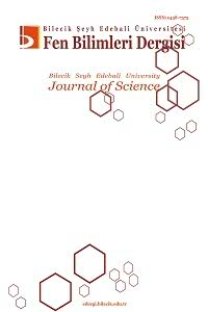Sentetik Polimerlerin Flokülasyonda Verimliliğini Etkileyen Faktörler
Anyonik Polimer, Endüstriyel Atık, Flokülasyon, Bulanıklık, Jar Deneyi
Factors Affecting Efficiency of Synthetic Polymers in Flocculation
Anionic Polymer, Industrial Waste, Flocculation, Turbidity, Jar Test,
___
- Adiansyah, J.S., Rosano, M.,Vink, S.,& Keir,G. (2015). A framework for a sustainable approach to mine tailings management: disposal strategies, Journal of Cleaner Production, 1081050–1062, https://doi.org/10.1016/j.jclepro.2015.07.139.
- World Information Service on Energy. (2019). WISE-Uranium Project, Chronology of Major Tailings Dam Failures. https://www.wise-uranium.org/mdaf.html. (Accessed 26 August 2022).
- Maurer, B. W., Gustafson, A. C., Bhatia, S. K., & Palomino, A. M. (2012). Geotextile dewatering of flocculated, fiber reinforced fly-ash slurry. Fuel, 97, 411-417.
- Cetin, D., Sengul, T., Bhatia, S. K., & Khachan, M. M. (2017). Effect of polymer and fiber usage on dewatering and compressibility behavior of fly ash slurries. Marine Georesources & Geotechnology, 35(5), 678-687.
- Sengul, T., & Bulut, A. (2022). Determination of the factors affecting the efficiency of the polymer in solid-liquid separation with synthetic polymers. Arab J Geosci 15, 858 https://doi.org/10.1007/s12517-022-10108-3
- Satyamurthy, R. & Bhatia, S. K. (2009). Effect of polymer conditioning on dewatering characteristics of fine sediment slurry using geotextiles. Geosynthetics International, 16(2), 83-96. https://doi:10.1680/gein.2009.16.2.83
- Sher, F., Malik, A., & Liu, H.(2013). Industrial polymer effluent treatment by chemical coagulation and flocculation, Journal of Environmental Chemical Engineering, 1(4), 684-689, https://doi.org/10.1016/j.jece.2013.07.003.
- Tassinari, B., Conaghan, S., Freeland, B., & Marison, I. W. (2015). Application of turbidity meters for the quantitative analysis of flocculation in a jar test apparatus. Journal of Environmental Engineering, 141(9), https://dx.doi.org/10.1061/(ASCE)EE.1943-7870.0000940
- ASTM D 6913-04. (2009). Standard test methods for particle-size distribution (gradation) of soils using sieve analysis. Annual Book of ASTM Standards.
- [ASTM D7928-17. (2017). Standard test method for particle-size distribution (gradation) of fine-grained soils using the sedimentation (hydrometer) analysis. Annual Book of ASTM Standards.
- ASTM D2035-19. (2019). Standard practice for coagulation - flocculation jar test of water. West Conshohocken, PA, United States. ASTM International. http://www.astm.org.
- Zhu, X., Reed, B. E., Lin, W., Carriere, P. E. & Roark, G. A. R. Y. (1997). Investigation of emulsified oil wastewater treatment with polymers. Separation Science and Technology, 32(13), 2173-2187.
- Oruç, F. & Sabah, E. (2006). Effect of mixing conditions on flocculation performance of fine coal tailings. XXIII. International Mineral Processing Congress, 3-8 September 2006, Istanbul-Turkey.
- Spritzer, J. M., Khachan, M. M. &Bhatia, S. K. (2015). Influence of synthetic and natural fibers on dewatering rate and shear strength of slurries in geotextile tube applications. International Journalof Geosynthetics and Ground Engineering,1(3), 26.
- Fatema, N., Bhatia, S. K. & Grady, W. F. (2018). Comparison of 1-D and 2-D geotextile dewatering tests with fly ash slurry. In Proceedings of the 11th International Conference on Geosythetics, 16-21. September 2018, Seoul, Korea.
- Yayın Aralığı: 2
- Başlangıç: 2014
- Yayıncı: BİLECİK ŞEYH EDEBALİ ÜNİVERSİTESİ
Türkiye Kısa Dönem Elektrik Yük Talep Tahmininde Makine Öğrenmesi Yöntemlerinin Karşılaştırılması
Kübra KAYSAL, Emre AKARSLAN, Fatih Onur HOCAOĞLU
Polimerik Membranlarda Zeolit Kullanımının Pervaporasyon Performansı Üzerine Etkisinin İncelenmesi
Null Kuaterniyonik Omurga Eğrisi Boyunca Kanal Yüzeyler
Fatma KESER, Mustafa KARATEPE, Serhat KESER, Suat TEKİN, İsmail TÜRKOĞLU, Omer KAYGILI, Ersin DEMİR, Prof. Dr. Ökkeş YILMAZ, Süleyman SANDAL, Sevda KIRBAĞ
Ni Nano Telinin Deformasyon Davranışına İkiz Sınır Aralığının Etkisi: Moleküler Dinamik Çalışması
Murat KARAER, Yusuf Murat KARDEŞ, Erdem GÜLÜMSER, Hüseyin T. GÜLTAŞ, Hanife MUT
Bir Holding İşletmesinin İşgücü Planlama Probleminin Markov Zincirleri Metodu ile Çözümü
Medine Nur TÜRKOĞLU ELİTAŞ, Muhammed KIR
Sadrettin GÖLCÜGEZLİ, Ahmet DUMLU
2-etil-4-metil-1,3-tiyazol-5-karboksilik Asitin Korozyona Karşı İnhibisyon Etkisinin İncelenmesi
